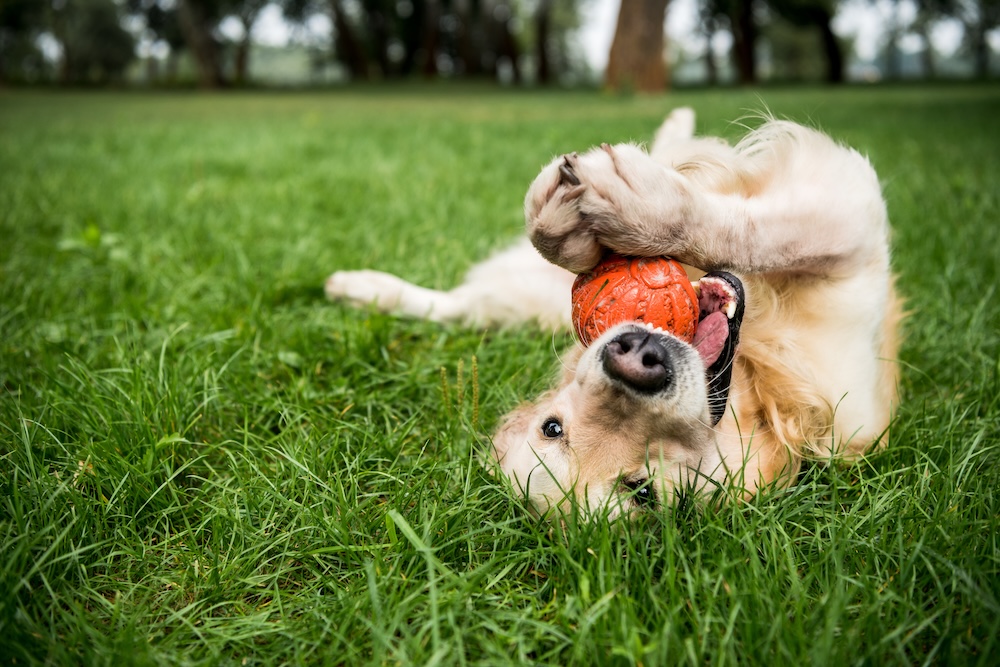At Faithful Friends Veterinary Clinic, we understand that playtime is more than just fun and games for your dog—it’s an essential part of their overall well-being. Engaging in regular play not only keeps your dog physically active but also sharpens their mental faculties and strengthens the emotional bond between pet and owner. Physical play is particularly crucial, serving as a natural outlet for your dog’s energy and an integral aspect of their health maintenance. Without adequate physical activity, dogs can develop not only physical health issues like obesity but also behavioral problems stemming from pent-up energy and boredom. This article explores the multifaceted benefits of dog playtime, emphasizing why vigorous physical activity through play is vital and providing tips on how to make the most out of these joyful moments.
Physical Health Enhancement
Playtime is a fundamental component in maintaining your dog’s physical health. Regular activity helps keep your dog fit, manages their weight, and reduces the risk of obesity-related diseases such as diabetes and heart disease. Here’s how structured play can make a difference:
- Exercise: Play acts as a fun way to get your dog moving. Activities like fetch, tug-of-war, or agility training provide cardiovascular benefits and help develop muscle tone.
- Coordination and Agility: Playing with different types of toys or engaging in obstacle courses can improve your dog’s coordination and agility, keeping their reflexes sharp and their bodies nimble.
Mental Stimulation
Dogs are intelligent creatures needing mental stimulation to stay mentally healthy and happy. Playtime challenges their minds and alleviates symptoms of boredom and anxiety.
- Problem Solving: Interactive toys, puzzles, and games that require your dog to solve problems can enhance their cognitive abilities.
- Prevention of Behavioral Issues: Dogs who are regularly engaged in mentally stimulating play are less likely to develop destructive behaviors, which are often the result of boredom or excess energy.
Emotional and Social Benefits
Playtime is also crucial for your dog’s emotional and social development. It helps them express natural behaviors and provides opportunities for important social interactions.
- Strengthening Bonds: Playing together strengthens the bond between you and your dog, building trust and affection.
- Social Skills: Group play sessions with other dogs can help improve social skills, teaching your dog about proper canine etiquette and reducing aggression and fear.
Tips for Effective Playtime
To maximize the benefits of playtime, consider these tips:
- Variety is Key: Rotate your dog’s toys and introduce new games to keep playtime exciting and engaging. Different types of toys stimulate different senses and skills, such as chasing balls, tugging ropes, or puzzle toys that reward with treats. This variety not only keeps your dog engaged but also ensures a well-rounded physical and mental exercise regimen.
- Safety First: Always supervise play sessions, especially with new toys or when multiple dogs are playing together. Ensure all toys are appropriate for your dog’s size and strength to prevent choking or other injuries. Check toys regularly for signs of wear and tear, replacing them before they become hazards.
- Know When to Stop: Watch for signs of fatigue or overstimulation. Dogs can get overtired, especially puppies, and may need time to rest. Signs of excessive panting, lagging behind, or losing interest indicate it’s time to wind down the play session.
- Interactive Play: Engage directly with your dog during playtime. This can include throwing a ball, playing tug-of-war, or running together. Interactive play not only increases the physical benefits of exercise but also deepens your bond.
- Training Integration: Incorporate training sessions into playtime. Use toys as rewards in training exercises to keep your dog motivated and make learning fun. For example, ask your dog to sit or stay before throwing the ball during a game of fetch.
- Adjust to Your Dog’s Needs: Tailor playtime activities to fit your dog’s age, health, and preference. Older dogs may need more gentle, low-impact play, while younger, more energetic dogs might enjoy longer, more vigorous activities.
- Consistency and Routine: Try to schedule playtime around the same time each day. A routine helps your dog understand when it’s time to play and when it’s time to relax, aiding in better behavior throughout the day.
These enhanced playtime strategies can significantly contribute to your dog’s health and happiness, fostering a joyful and energetic companion ready to engage and interact with the world around them.
Integrating Play Into Daily Routines
Incorporating play into your daily routine doesn’t have to be a time-consuming task. Here are a few simple strategies:
- Scheduled Play Sessions: Just like walks, schedule regular play sessions to ensure they become a part of your daily routine.
- Active Toys: Use toys that encourage your dog to move around, even during solo play.
- Family Involvement: Encourage all family members to engage in playtime with your dog to diversify interactions.
At Faithful Friends Veterinary Clinic, we advocate for the holistic health of your pets, and playtime is a significant part of a well-rounded health regimen. Regular play helps ensure that your dog remains healthy, alert, and content. Remember, a playful dog is a happy dog. So grab that ball or frisbee and enjoy the endless benefits that come from playing with your canine companion. It’s not just fun; it’s beneficial for their body and soul!




